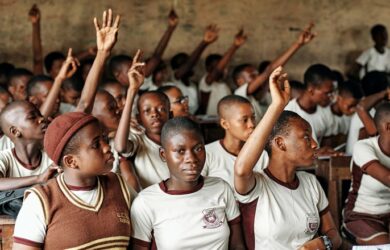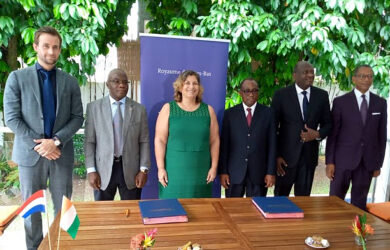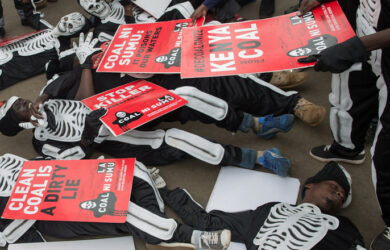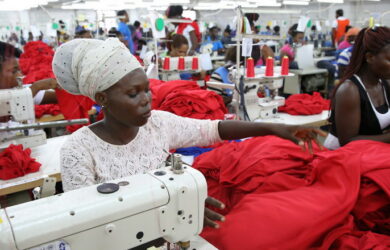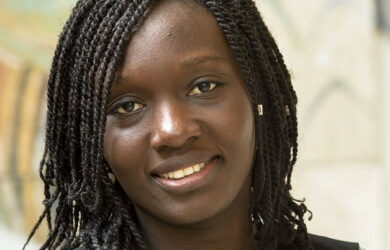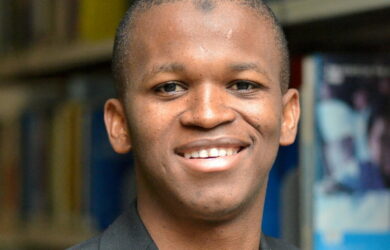- ABOUT US
- RESEARCH
- EDUCATION
- The Graduate School
- PhD Programme
- MSc Programmes
- Capacity Development
- News
- Design and Evaluation of Public Policies (DEPP)
- Design and Evaluation of Innovation Policies (DEIP)
- Evidence-Based Policy Research Methods (EPRM)
- Migration Management Diploma Programme (MMDP)
- Moving the Migration Policy Agenda Forward (MMPAF)
- Online Courses
- Short Courses (Masters)
- Tailor-made programmes
- UNU-MERIT, ITU Academy Training Centre
- Alumni
- Academic Funding
- NEWS
- EVENTS
- PUBLICATIONS
- LIBRARY
Nigeria has democracy but not development: Book review
23 August 2021
After struggling for 39 years to develop a fertile ground for democratic governance, Nigeria had its turning point in May 1999 when it became the world’s fourth largest democracy. This came after 16 years of brutal military rule. Despite complaints of fraud by political opposition in each election held since 1999, local and international election observers have regarded each of Nigeria’s general elections as relatively free and fair. On the economic front, Nigeria is now the largest economy in A...
Continue Reading →Knowledge 2 Knowledge Entrepreneurship programme launched in Côte d’Ivoire
12 July 2021
Knowledge 2 Knowledge Entrepreneurship, Côte d’Ivoire, is a one-year capacity-building training programme to help knowledge institutes in Côte d’Ivoire to foster an entrepreneurial mindset and skills in their students. The project hopes to achieve a lasting positive and tangible impact on job creation in a country and world region faced with high levels of youth unemployment. While Africa is the only region where the youth population will continue to grow, over one in five youth are not in emplo...
Continue Reading →Areas in Africa with more Chinese-backed projects were more likely to experience protests
16 June 2021
Bruno Martorano, United Nations University; Francesco Iacoella, United Nations University; Laura Metzger, Harvard Kennedy School, and Marco Sanfilippo, Università di Torino Chinese investment in Africa has helped spark economic growth and improve social outcomes across the continent. Yet Chinese projects often seem to go hand in hand with civil protests. We wanted to find out whether these were isolated incidents or signalled broader discontent among the population. In new research, we show that...
Continue Reading →PhD fellow tops World Bank call to visualise development impact
16 April 2021
The World Bank launched its Development Impact blog on 1 April 2011, and has since published exactly 1500 posts. To celebrate turning 10, the editors of the blog decided to replace its meteor logo with something that better captures the aim of development research: i.e. to inform on the range of potential outcomes and choices in policy design and development processes. Responding to a call for artistic ideas, our Bolivian-Italian PhD fellow Mariajose Silva-Vargas sent in the image above, which w...
Continue Reading →Many African countries had a surprise manufacturing surge in 2010s – it bodes well for the years ahead
18 February 2021
The COVID-19 pandemic has wreaked havoc on the global economy, with world output contracting at 3.5% in 2020, and no recovery likely before the fourth quarter of 2021. Similar to other developing regions, sub-Saharan Africa recorded a 2.6% decline, following strong growth of 3.2% in 2019. Unfortunately, this comes at a time when the region has been experiencing a surprising and very welcome manufacturing renaissance. Historically, industrialisation has been associated with rapid technological im...
Continue Reading →Women scientists at forefront of COVID-19 research
11 February 2021
Women researchers have been at the forefront of the fight against COVID-19, with female scientists across the globe playing pivotal roles, from advancing knowledge on the virus, to developing vaccines, treating patients and assessing the pandemic’s devastating economic and social impact. However, the health crisis has laid bare disparities in the scientific system. Girls are significantly under-represented in Science Technology Engineering and Mathematics (STEM) subjects at school, and women occ...
Continue Reading →‘Black Voices Matter’ #3: Does systemic or implicit bias freeze the careers of black academics?
19 January 2021
Inspired by the ‘Black Lives Matter’ movement, this series is the product of an international team from UNU-MERIT that first came together in the summer of 2020. It aims to provide a substantial and accessible platform in the fight against racism, articulated by young African thought-leaders who put a premium on robust debate and other non-violent approaches. #blacklivesmatter #whiteforblack … One issue barely registers in the Black Lives Matter movement, and that is the career challenges ...
Continue Reading →‘Black Voices Matter’ #2: What have the protests achieved and should they always be non-violent?
06 November 2020
This is an extraordinary moment in world history. While it is too early to assess the global impact of the Black Lives Matter movement, emerging evidence indicates that it has made significant progress. The first significant impact of the protests has been the toppling of Confederate and slavery-related statues around the world. In England, protesters toppled the statue of Edward Colston, a prominent slave trader. In Belgium, protesters set fire to a statue of King Leopold II. In the USA, statue...
Continue Reading →‘Black Voices Matter’ #1: Breathing new life into the global fight against racism
02 November 2020
Since the end of World War II, the United States of America has been the leading voice in the promotion of human rights, equality and non-discrimination. In fact, from 1933 to 1945, it was the US First Lady Eleanor Roosevelt who spearheaded the drafting and negotiations of the Universal Declaration of Human Rights, which eventually came into force in 1948. Human rights explicitly became a major part of US foreign policy in the 1970s, and since 1976 the Department of State's Bureau of Democracy, ...
Continue Reading →In Memoriam: Ibrahima Sory Kaba
02 September 2020
It is with deep sadness that we bring you the news that our colleague and friend Ibrahima Sory Kaba passed away on 1 September 2020, at the age of 32. Ibrahima started at UNU-MERIT as a PhD fellow, and completed his PhD thesis entitled ‘Aggregate Fluctuations and Development: Essays on Macroeconomic Volatility and Economic Growth’ in 2019. After his period as PhD fellow, he took up a teaching position at UNU-MERIT’s sister department, MILE, at Maastricht University’s School of Business and Econo...
Continue Reading →Archives
Contact
UNU-MERIT
Boschstraat 24
6211 AX Maastricht
The Netherlands
T: +31 43 388 44 00
Email: info@merit.unu.edu
Boschstraat 24
6211 AX Maastricht
The Netherlands
T: +31 43 388 44 00
Email: info@merit.unu.edu
Partner sites
Newsletters
© 2024 UNU-MERIT | Maastricht University


